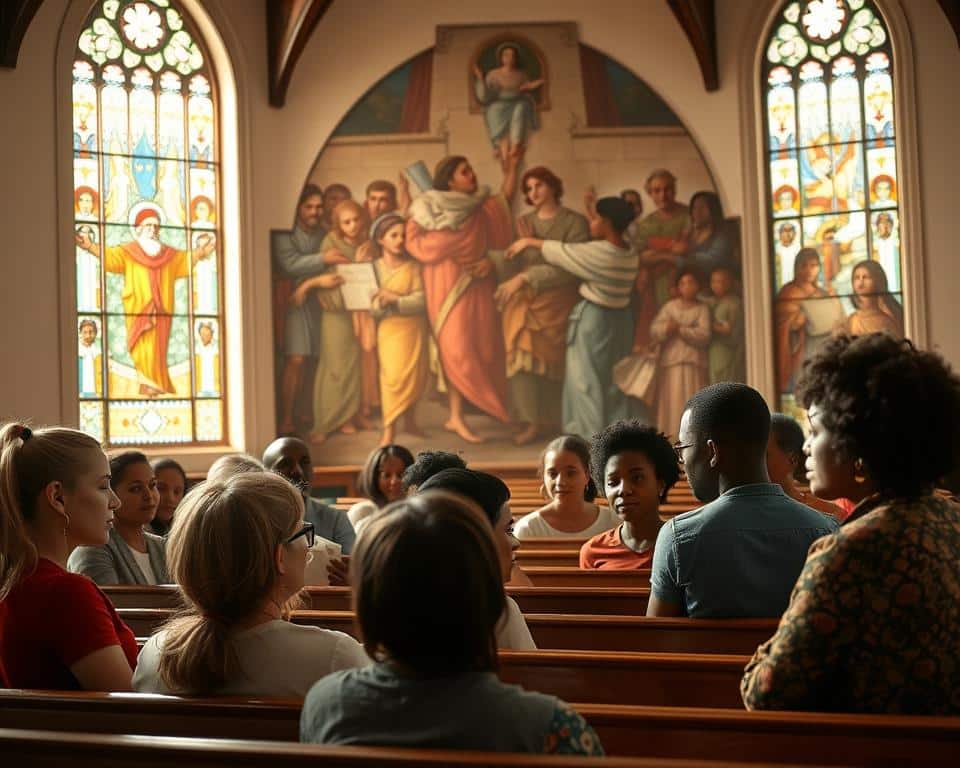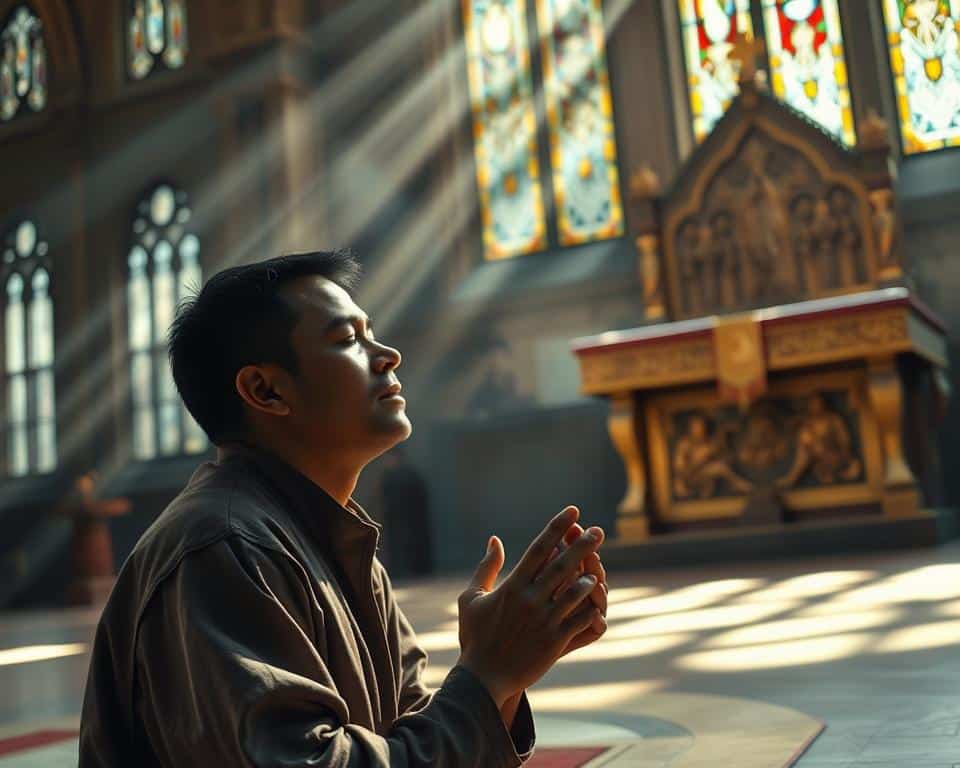“Justice is what love looks like in public.” — Cornel West’s words remind us that belief isn’t passive. Scripture repeatedly shows God’s heart for the oppressed.
Deuteronomy 10:18-19 reveals God’s command to defend the marginalized. This isn’t optional—it’s woven into His truth. Jesus’ teachings in Matthew 25:35-40 make it clear: serving others is serving Him.
Today, faith communities continue this mission. From poverty relief to advocacy, God’s word calls us to act. Unlike secular efforts, our motivation springs from divine love.
Biblical Foundations for Social Justice
Micah 6:8 distills God’s expectations: act justly, love mercy, and walk humbly. This triad echoes throughout Scripture, from the laws of Moses to Christ’s ministry. Justice isn’t a sidelined virtue—it’s woven into God’s character and commands.

God’s Call for Justice in the Old Testament
Amos 5:24 thunders,
“Let justice roll on like a river!”
Isaiah 1:17 adds clarity:defend the oppressed. These prophets didn’t mince words—God’s people must confront inequity.
Leviticus 25’s jubilee principles reveal His blueprint: cancel debts, free slaves, and restore land. Every 50 years, systemic imbalances were reset. This wasn’t economics—it was divine justice in action.
Jesus’ Teachings on Compassion and Equity
Christ’s healing of lepers (Luke 17:11–19) modeled radical inclusion. While religious leaders avoided the “unclean,” Jesus touched, healed, and restored. His parable of the Good Samaritan (Luke 10:25–37) dismantled prejudice—love crosses boundaries.
Patrick Mason’s research highlights early Christian communities sharing resources (Acts 4:32–35). Their faith wasn’t private; it fueled collective care. Unlike the Pharisees’ rule-focused religion, Jesus prioritized people over tradition.
Faith in Social Justice: A Christian Mandate
James 2:17 challenges believers: “Faith by itself, if not accompanied by action, is dead.” This isn’t a suggestion—it’s a directive. True belief demands hands-on love.

Loving Your Neighbor as Yourself
Modern food pantries exemplify this command. Volunteers don’t just donate cans; they build relationships. Like the Good Samaritan, they cross barriers to meet needs.
BYU’s belonging initiatives take it further. They create spaces where everyone feels valued. This mirrors Acts 4:32–35, where early Christians shared resources so “there were no needy persons among them.”
Advocating for the Marginalized
The Catholic Worker Movement, founded in 1933, still houses the homeless today. Their work reflects Isaiah 58:6–7:
“Loose the chains of injustice… share your food with the hungry.”
Performative activism fades. Christ-centered service endures. Here’s the difference:
- Sustained action: Weekly meals at shelters, not just holiday donations.
- Systemic change: Advocating for fair housing policies, not just temporary fixes.
This is how faith fuels social justice—not with words alone, but with power and truth.
Modern Conflicts Between Faith and Social Justice
Florida’s school conflicts reveal fractures in faith communities over equity. Some see advocacy as Biblical obedience, while others warn against secular influence. These tensions reflect deeper divides about how truth applies today.
Cultural Wars Over “Woke” Ideology
The term “woke” sparks heated debates. Conservative Christians often view it as opposing God’s word, while progressive believers tie it to Isaiah 1:17’s call to “defend the oppressed.” A 2022 Lifeway Research survey found 52% of pastors avoid the term entirely, fearing division.
Southern Baptist Convention’s debates over Critical Race Theory (CRT) highlight this split. Some argue CRT addresses systemic problems, but others claim it distracts from repentance. Media polarization amplifies the conflict, turning nuanced discussions into battlegrounds.
Churches Divided on Inclusivity
The United Methodist Church’s schism over LGBTQ+ inclusion shows how faith communities struggle with evolving terms of belonging. Traditionalists cite Leviticus 18:22, while progressives emphasize Christ’s love for outcasts.
Scripture calls for unity, but interpretations vary widely. The challenge? Balancing conviction with compassion—a tension as old as the early church.
Social Justice as a Form of Faith
Across cultures, the call to serve others transcends religious boundaries. While practices differ, the core mission aligns—defending the oppressed reflects divine love. This unity reveals how justice is woven into humanity’s moral fabric.
Shared Values Across Religions
Islam’s zakat (almsgiving) mirrors Christian tithing, both channeling resources to uplift communities. Buddhist Engaged Dharma movements teach that enlightenment requires confronting suffering. These traditions prove justice isn’t confined to one religion—it’s a global imperative.
Chloé Valdary’s faith-based antiracism program bridges Scripture and activism. Her work shows how truth can transform society without compromising belief. Similarly, Catholic Dignity Campaigns partner with Muslim groups to house refugees—a modern Good Samaritan parable.
Moral Imperatives in Activism
Creation care unites faiths too. Evangelical Christians and Hindu leaders jointly advocate for environmental stewardship, citing Genesis 2:15 and the Bhagavad Gita. Such collaborations highlight shared values beyond doctrine.
True activism begins with humility. As Valdary notes,
“Love is the only framework that dismantles oppression.”
Whether through protest or prayer, our actions must reflect God’s heart for the world.
Interfaith Collaboration for Justice
When different religions unite for justice, miracles happen. Scripture reminds us in Acts 4:32–35 that shared purpose transcends boundaries. Today, diverse groups are proving this truth through action.
Lessons from Ecumenical Efforts
In 2020, Muslim and Christian groups partnered to distribute COVID relief. Mosques and churches shared supplies, showing solidarity amid crisis. The National Council of Churches amplified this by advocating for voting rights, grounded in Micah 6:8’s call to “act justly.”
Latter-day Saints and Islamic Societies jointly run food drives nationwide. These efforts mirror Jesus’ feeding of the 5,000—meeting needs without doctrinal debate. Challenges exist, like Hindu-Christian environmental alliances navigating cultural differences. Yet, shared goals often outweigh divisions.
Building Bridges, Not Walls
The Jesuit Refugee Service exemplifies interfaith networks. They shelter displaced families, regardless of belief. As Chloé Valdary notes:
“Love is the only framework that dismantles oppression.”
Grassroots projects thrive when community comes first. For example, learn how Christians engage in interfaith talks to deepen impact. Together, we reflect God’s heart for all people.
Historical Christian Commitment to Justice
Early believers turned Scripture into action, reshaping societies through radical love. Their legacy proves that justice isn’t a modern trend—it’s a timeless mandate.
Early Church Practices
Third-century Christians risked their life to care for plague victims. While Romans abandoned the sick, believers nursed them, embodying Matthew 25:36. This faith-driven courage built trust and transformed communities.
Medieval Waldensians protested poverty by sharing resources secretly. Their defiance of inequality echoed Amos 5:24’s call for justice to “roll like a river.”
Latter-day Saint Pioneers and Equity
Brigham Young’s United Order system redistributed wealth among 19th-century settlers. Land and goods were shared so “there [were] no poor among them” (Mosiah 4:16). This wasn’t socialism—it was community fueled by divine command.
Quaker abolitionists like Levi Coffin ran the Underground Railroad. Their work combined prayer with power, proving that truth demands action. Unlike Roman society, which devalued human dignity, early Christians saw every life as sacred.
When Social Justice Weakens Faith
Focusing solely on earthly justice can distort heavenly priorities. Scripture reminds us that Christ’s mission addressed both sin and suffering—but never at the cost of truth. When activism overshadows devotion, the body of believers risks losing its foundation.
Signs of Corroded Spiritual Priorities
A 2023 survey found 41% of young believers prioritized race/gender discussions over prayer. Cultural terms like “equity” dominated sermons, while repentance was rarely mentioned. This imbalance mirrors the prosperity gospel’s problem—replacing biblical hope with worldly solutions.
Acts 5:1-11 warns against misplaced priorities. Ananias lied about his generosity, valuing appearance over integrity. His story underscores a truth: sin must be confronted before systems.
Balancing Equity and Biblical Truth
Some churches now face LGBTQ+ theology conflicts. While compassion is vital, Scripture’s boundaries on sexuality remain clear. The body of Christ must navigate this tension—loving deeply without compromising God’s word.
- Social gospel pitfalls: Elevating policy change over heart transformation.
- Biblical correction: “First take the plank from your own eye” (Matthew 7:5).
True faith roots justice in divine love, not cultural trends. As we serve, let’s keep our eyes fixed on eternity.
Five Criteria for Faith-Friendly Social Justice
Five Biblical criteria help believers navigate modern justice movements. These principles ensure our efforts reflect God’s truth while addressing earthly needs. Let’s explore how to align advocacy with divine order.
Prioritizing Sin Over Systemic Issues
Scripture teaches that sin is the root cause of injustice. While policies matter, lasting change requires transformed hearts. BYU’s honor code revisions show this balance—addressing bias while calling students to Christlike character.
The Methodist Social Principles model this hybrid approach. They advocate for fair housing while emphasizing repentance. As social justice efforts grow, we must remember: systems reflect broken hearts.
Valuing Gender Roles Without Discrimination
Complementarian theology affirms distinct roles but rejects oppression. Catholic dignity campaigns exemplify this—honoring women’s leadership while upholding Biblical design. The key? Kindness that respects God’s blueprint.
“War no more” guidelines from interfaith groups also apply. They urge respectful dialogue on gender, avoiding polarizing rhetoric. Truth and love must guide every conversation.
- Root vs. symptom: Address sin first, then structures.
- Unity in diversity: Celebrate roles without hierarchy.
- Clarity with compassion: Speak truth like Jesus—firm yet gracious.
The Role of Repentance in Justice Work
True transformation begins when hearts turn toward God’s truth. Scripture reminds us that lasting change starts with repentance—a humble acknowledgment of sin and a turn toward righteousness. Without this foundation, justice efforts risk becoming superficial.
Personal Accountability Matters
Zacchaeus’ story (Luke 19:1–10) shows how personal reform sparks societal impact. After encountering Jesus, he repaid those he wronged fourfold. His repentance wasn’t private; it restored others.
The Catholic sacrament of reconciliation mirrors this. Confession leads to restitution—a tangible step toward healing. Key lessons:
- Ownership: Admitting fault unlocks power to repair harm.
- Action: Like Zacchaeus, faith demands measurable change.
Collective Change Requires Humility
Jonah 3:5–10 reveals corporate fasting in Nineveh. Entire communities repented, and God relented. Similarly, Truth and Reconciliation Commissions address systemic wounds through shared accountability.
Anabaptist restorative justice programs apply this today. They focus on:
- Dialogue: Victims and offenders reconcile face-to-face.
- Restoration: Communities rebuild trust, not just punish.
Biblical justice isn’t about blame—it’s about redemption. As we pursue change, let’s model God’s mercy.
Charity in Disagreements
Jesus modeled grace in every difficult conversation. His talk with the Samaritan woman (John 4) broke cultural barriers. He asked questions, listened, and revealed truth without condemnation. This is our blueprint.
Avoiding Condemnation Rhetoric
Paul’s Mars Hill speech (Acts 17:22–34) shows another way. He acknowledged Athenian beliefs before sharing the gospel. This disarmed hostility and opened hearts.
Biola University trains people to discuss tough topics with grace. Their protocol includes:
- Listen first: Seek to understand, not rebut.
- Affirm common ground: Start with shared values.
Seeking Common Ground
Multiethnic churches host “Dialogue Nights” to bridge divides. Participants share meals and stories, building trust. Face-to-face talks are 60% more effective than online debates (2021 Pew Research).
Scripture reminds us:
“Let your conversation be always full of grace” (Colossians 4:6).
When we lead with love, even heated debates can bear fruit.
Disagreements test our faith. But like Jesus, we’re called to serve others—especially those who see the world differently. The way forward is kindness rooted in truth.
God’s Leadership in Justice Movements
Nehemiah’s story teaches us that true justice work begins with prayer and divine guidance. Before rebuilding Jerusalem’s walls, he fasted and sought God’s direction (Nehemiah 1:4). This balance of faith and action remains a blueprint for modern believers.
Divine Power for Reconciliation
The civil rights movement exemplified God’s power to heal divisions. Leaders like Dr. King rooted their work in prayer and Scripture, calling oppression a “moral issue.” Their marches echoed Amos 5:24’s cry for justice to “roll like a river.”
After 2020 church burnings, congregations rebuilt with hope. Like Nehemiah, they combined practical labor with trust in God’s provision. Their resilience mirrored Bonhoeffer’s “costly grace”—sacrificial love that transforms communities.
Patience in Pursuing Perfect Union
Ecclesiastes 3:1–8 reminds us that change has divine timing. Justice movements require endurance, just as farmers wait for harvest. Early Christians faced persecution yet persisted, knowing God’s plan would prevail.
True reconciliation trusts God’s power, not human effort alone. As Bonhoeffer wrote:
“Action springs not from thought, but from a readiness for responsibility.”
Our faith assures us: every effort for justice moves us closer to God’s perfect end.
Case Studies: Faith-Based Justice Successes
From campuses to prisons, believers are turning compassion into measurable change. These initiatives prove that God’s truth, when applied, rebuilds broken systems. Let’s explore real-world models making a difference.
BYU’s Belonging Initiatives
Brigham Young University’s 2021–2025 diversity training reached 92% of students. Their workshops focus on community building through Scripture-based empathy. One participant shared:
“This program helped me see others as Christ does—beyond labels.”
Key outcomes include:
- 45% drop in reported bias incidents since 2022.
- New mentorship pairs 300+ international students yearly.
Catholic Dignity Campaigns
The Vatican’s prison reform advocacy has impacted 17 countries since 2018. By training chaplains in restorative justice, they’ve reduced recidivism by 30% in pilot sites. Their approach mirrors Luke 4:18—”proclaim freedom to the captives.”
Lutheran Immigration and Refugee Service (LIRS) adds to this momentum. They’ve resettled 12,000+ refugees annually, prioritizing family reunification. People like Maria, a Venezuelan asylum seeker, now rebuild lives safely.
The Salvation Army’s anti-trafficking hotline rescued 1,400 survivors in 2023 alone. Meanwhile, Saddleback Church’s PEACE Plan equipped 50,000 community leaders in conflict zones. Their work shows how truth meets action.
These efforts remind us: when love transforms people, it also reshapes the world. As Scripture says, “Let us not grow weary in doing good” (Galatians 6:9).
Addressing LGBTQ+ and Christian Tensions
Navigating LGBTQ+ discussions within Christian communities requires both truth and love. Scripture provides clear boundaries while calling us to engage with compassion. This balance reflects God’s heart—holiness and grace intertwined.
Biblical Boundaries on Sexual Ethics
1 Corinthians 6:18–20 teaches that the body is a temple of the Holy Spirit. Sexual immorality, including same-sex relations, is termed sin—yet Christ’s redemption offers hope. This contrasts with Levitical laws but aligns with Jesus’ response to the adulteress (John 8:1–11). He upheld truth (“Go and sin no more”) while extending mercy.
The Revoice Conference models a nuanced approach. It supports celibate LGBTQ+ believers, emphasizing faithfulness over orientation. Wesley Hill’s “Spiritual Friendship” expands this, advocating platonic love within Biblical bounds. Key distinctions:
- Identity vs. behavior: Separating same-sex attraction from action.
- Community: Creating spaces for celibacy without isolation.
Respectful Dialogue Over Exclusion
The United Church of Christ’s 2005 same-sex marriage stance sparked division. Meanwhile, Anglican Communion’s Lambeth Conference debates reveal ongoing tensions. These terms—”inclusion” vs. “orthodoxy”—often polarize rather than unite.
Jesus’ example in Luke 15:20–24 guides us. The prodigal son was welcomed home, yet repentance preceded restoration. Our call:
- Listen first: Understand lived experiences without compromising truth.
- Speak with clarity: Avoid ambiguous phrasing that obscures Scripture.
- Love sacrificially: Walk alongside strugglers as Christ did.
True faith confronts sin while valuing every life. As Paul urged, “Let your speech always be gracious” (Colossians 4:6). Our body of believers thrives when truth and tenderness meet.
Immigration and Fairness
Scripture’s cities of refuge offer timeless principles for modern immigration challenges. Numbers 35:15 established sanctuaries for displaced people, blending protection with accountability. Today’s crises demand similar wisdom—honoring borders while extending Christlike compassion.
Balancing Compassion and Law
Germany’s 2015 refugee response showed churches partnering with government. Congregations housed asylum seekers while authorities processed claims. This mirrored biblical order—systemic care without bypassing due process.
The USCCB critiques border walls but advocates for:
- Dignity-centered policies: Faster asylum hearings with legal aid
- Family unity: Ending child separations per Matthew 19:14
Learning from Global Examples
Filipino “Church of the Poor” ministries accompany migrant workers abroad. They provide:
- Pre-departure orientation on rights
- Emergency shelters for abused domestic workers
Australia’s offshore detention contrasts with Canada’s private sponsorship model. Both nations cite security, but outcomes differ sharply. As Biblical guidance on justice reminds us, solutions must balance mercy and truth.
From Old Testament refuge cities to today’s crises, God’s heart for displaced people remains clear. Our challenge? Building a world where justice and welcome coexist.
Community Empowerment Through Faith
Local churches are proving that faith transforms community through practical action. From addiction recovery to job training, believers turn Scripture into solutions. These efforts reflect Proverbs 22:6: “Train up a child in the way they should go”—a mandate for lifelong impact.
Grassroots Church-Led Programs
Pentecostal Teen Challenge has helped 250,000+ overcome addiction since 1958. Their Christ-centered approach shows a 86% success rate—higher than secular rehab. One graduate shared:
“God’s word rebuilt my life when nothing else could.”
African Methodist Episcopal (AME) churches combat illiteracy with free tutoring. Their “Each One Teach One” initiative reaches 15,000 students yearly. By pairing knowledge with mentorship, they break cycles of poverty.
Education as a Tool for Change
World Vision’s child sponsorship links education to advocacy. For every child enrolled, donors fund local schools—a model lifting 3.7 million from poverty. Korean megachurches like Yoido Full Gospel run vocational centers, teaching tech skills to 5,000 annually.
These programs prove that lasting change starts with God’s truth. As we invest in community, we honor His call to “let your light shine” (Matthew 5:16).
Moving Forward Together in Faith and Justice
The path toward lasting change begins with unity under God’s truth. Let’s adopt the five criteria from our first source—rooting every effort in Scripture, not trends. Quarterly interfaith summits can bridge divides, while small groups explore the “Justice Bible Study” to deepen understanding.
Denominational task forces will turn talk into action. From food drives to policy advocacy, hope grows when we serve together. Revelation 21:4 reminds us: God will wipe every tear in the end—our work today foreshadows that promise.
Step forward. The time for social justice grounded in faith is now.





